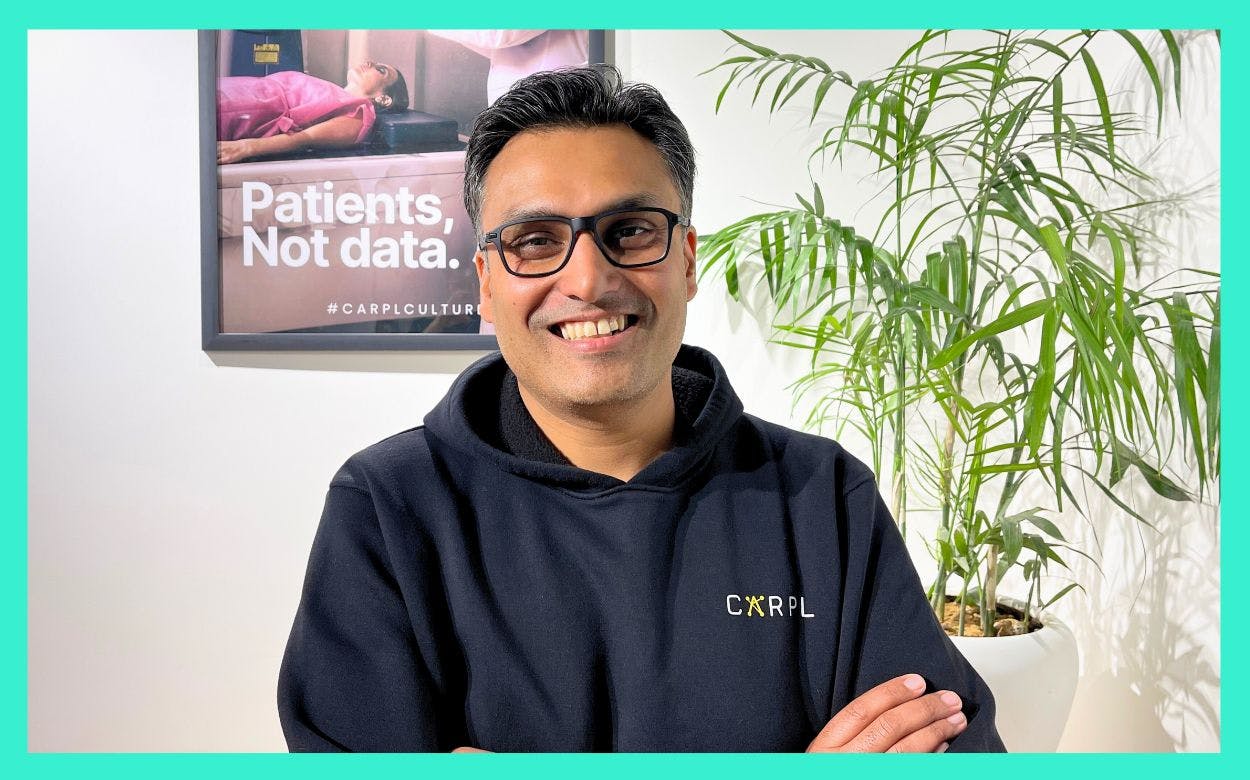Dr. Vidur Mahajan (CEO, CARPL.ai)
Dr. Vidur Mahajan serves as the Chief Executive Officer of CARPL.ai—an enterprise imaging AI platform that brings 110+ AI applications from 45+ vendors into radiology workflows. Previously, he ran Mahajan Imaging, India’s leading radiology chain. He has authored over 120 academic and conference papers in the field of AI and imaging globally. Dr. Mahajan holds an MBA with dual majors in finance and healthcare management from the Wharton School of Business and studied medicine at Sion Hospital, Mumbai.

Can you explain your job to a five-year-old?
Interestingly, I have six-year-old twins, and they have no idea what I do!
Basically, if you get hurt and you feel a lot of pain in your arm, you go to a hospital. In that hospital, there's a fancy camera that takes a picture of your hand, but it can show you inside. It can see inside your hand and it can tell you whether or not your bone is broken. I make software that makes those machines smart and allows them to tell if your bones are broken in a better way than the doctor uncle or doctor auntie who looks at the picture and then sees whether your bone is broken or not. I make those cameras into smart cameras so that the cameras themselves
can tell us whether the bone is broken or not.
What excites you most about your job?
I think that's easy. It's the look on people's faces when they see our demo. I think that is something that is absolutely phenomenal. People's eyes light up. We have a validation platform that basically allows people to benchmark various AI solutions. It's always amazing to see their eyes light up when we show them the statistical metrics and all of that. It's that kind of ‘eye popping out their head’ kind of feeling and that's what gets me up and about—it's our customers and the reaction they have to our demos.
Which trend will change the future of medicine?
So, I'm obviously biased but it would have to be clinical automation, so automating the work that a doctor does. Making the doctor five times to ten times more impactful, harnessing the power of AI. But very specifically, it would be automating clinical work.
We've seen administrative automation. We've seen billing, scheduling, and all of that happen. But the actual delivery of care is something where only maybe the worlds of lab medicine and pathology have seen a lot of automation. But we’re extrapolating that to radiology and then other branches of medicine and then eventually surgery simply again, because the truth of our world is that if you don't have money, you die. And it is linked to the fact that there are more doctors in areas where there is more money, and thereby more access. So, the only technology that can break this so-called iron triangle of healthcare of access, affordability, and quality is AI—specifically clinical AI.
Looking back, which trends have you missed or underestimated?
I think just the importance of storing data in a meaningful and structured manner is something that I think everyone overlooked, though maybe some less than others. Generally, it was looked at as something that was driven by regulation and has now proven to be just so valuable in terms of building these AI solutions or just getting more insights about your patient. So, I think just not deleting data is something that's been overlooked by a vast majority of players out there and it's now proving to be pretty useful for those who have it.
Which MedTech initiative or startup deserves more attention?
In many parts of the world, there's true consumerization of healthcare happening. One startup that I’m particularly a fan of is a startup called Curelink which has basically built a WhatsApp-based digital therapeutics solution. Basically, a doctor, instead of prescribing a medicine or in addition to prescribing a medicine, prescribes this WhatsApp-based engagement program.
If you're enrolled into this program, you get a series of messages and conversations every day, every week that help you adhere to the care program you’re assigned to. So I think that is supremely innovative. I think that is something that is a game changer because there is that layer of democratization that it brings in.
Where would you put a million dollars?
Oh, that's very easy. So, I'm from India. I would just feed a million people. A million people could get a couple of days’ food with a million dollars. So, I could either feed a thousand people for three years or I would basically give out 4 million meals. There's people dying in my country because they don't have food. It is as ridiculous as that. So I’d just give them food and make them not die.
What's the best advice you've ever received?
Take the right advice from the right people and not all advice from a set of people. The idea is that not everyone is good at everything. But everyone who cares about you will always have an opinion, a well-meaning opinion, about what you should do. But it's very important to take the right advice from the right person who has the right to give that advice.